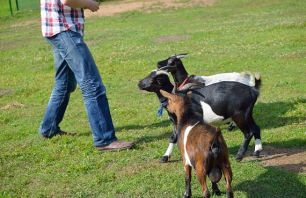
Small landholders
Biosecurity is good for your small landholding
Practicing good biosecurity means taking action to protect your hobby farm or small landholding from the negative impacts of pests, diseases, weeds, and contaminants.
Being biosecure will help: 
- Keep your animals safe from disease
- You to grow more produce and reduce impacts of weeds and pests
- Help our primary producers gain better yields at lower costs, whilst maintaining access to interstate and international markets
- Reduce stock losses and infrastructure damage by pest animals.
Everyday farming and gardening practices are all part of being biosecure.
This includes:
- Good weed management
- Pest animal control and management
- Participating in the National Livestock Identification System, traceability and market assurance programs
- Having the right licences, registrations and permits
- Preventing the spread of disease and pests by checking materials and machinery when they enter and leave your property for unwanted hitchhikers
- Educating farm visitors on the importance of biosecurity
- Having an emergency disease action plan.
Building biosecurity for small farms - A small farms network guide PDF, 6483.95 KB
There are certain actions a small landholder or hobby farmer MUST legally take to be biosecure. These are detailed in the Biosecurity Act 2015 and supporting legislation.
The laws cover things that are likely to have the biggest impact on our economy, environment or community. They include rules around:
- High risk and priority pests and diseases that MUST be reported - these are known as ‘notifiable pests and diseases’, ‘prohibited matter’ and ‘biosecurity events’
- Controlling the movement, keeping and release of pest animals
- Controlling the movement, treatment and importation of plants
- Having the right accreditation, registrations, certificates and permits
Visit the Biosecurity policies and procedures page for more.
Your general biosecurity duty
As well as prescribing the rules for high risk biosecurity matter, the Biosecurity Act 2015 includes a biosecurity duty for small lot holders and hobby farmers and everyone who deals with biosecurity matter.
This means that all tiers of government, industry and the people of NSW need to work together to protect the economy, environment and community from the negative impacts of pests, diseases, and weeds and contaminants.
This means businesses need to:
- know about your biosecurity risks
- know what action should be taken to manage these risks
- take effective action to manage the risks relevant to you.
You are supported in managing biosecurity by the department, Local Land Services, other public and private land managers, community members and peak industry bodies.
Visit the General biosecurity duty page for more information.
The trick to managing biosecurity is that every small landholder or hobby farm will have different challenges and risks to manage based on its location, seasonal conditions, activities, what is being produced, and its visitor profile.
A biosecurity plan can help you to identify the risks in your business and prioritise the biosecurity practices relevant to those risks.
Information on how to develop a farm management plan can be found at Farm Biosecurity.
NSW DPI has established a program to link people in areas on the urban fringes (known as peri-urban areas) to build their capacity and capability to manage biosecurity risks.
Read more about the Peri Urban Program and how to participate.
NSW Hobby Farmers Community
NSW DPI has also set up a Facebook Group - NSW Hobby Farmers Community so that people in this sector can share ideas and learn from each other.
Our community is a place for small landholders, hobby farmers and peri-urban stakeholders to share information, interact and collaborate on biosecurity, productivity and plant and animal health.
We will provide information about services, events and training opportunities which can help support farmers:
- keep happy and healthy livestock
- produce profitable and productive plants
- learn more about being a responsible small landholder / hobby farmer.
VETLEARN - Veterinarians, hobby farmers and backyard livestock
About the course
Veterinarians, hobby farmers and backyard livestock is a new e-learning course as part of a national initiative between the department, Animal Health Australia and the Australian Veterinary Association.
It is a two-hour online course that provides veterinarians with the confidence and resources to build their business and improve engagement with hobby farmers, smallholders and clients with backyard livestock. The course will help veterinarians improve biosecurity outcomes with smallholders, resulting in early detection of disease.
This free course is relevant to all veterinarians nationally and will earn 2 CPD or VETED points.
How to register
You will only need to register for the course once.
- Visit the EMtrain website.
- Click on Create new account (below the log in icon), and fill in all fields
Note: Please ensure you use a personal email address rather than a shared one - An email will be sent to you to confirm your registration. Click on the link in the email to complete the login process, which will direct you to the EMtrain homepage
- Once you are logged into EMtrain, click on View Catalogue, select Additional Skills, then select the Veterinarians, Hobby Farmers and Backyard Livestock course
- Once you are on the home page of the course, click the course heading in the grey box, then select the Enrol Me icon to be taken to the page for course commencement
How to log in
- Log in via the EMtrain website, using your log in credentials
Note: Any courses you have enrolled in will appear on the homepage
- Click on the Veterinarian, Hobby Farmer and Backyard Livestock course
Click on the title in the grey box to enter the course
More info
This course consists of an introduction, four modules and an assessment.
You must visit all modules before attempting the assessment. In order to pass the course, you will need to achieve an assessment result of 80% or higher.
You will be able to print a Certificate of Completion once the assessment is complete.
Questions or comments should be directed to:

